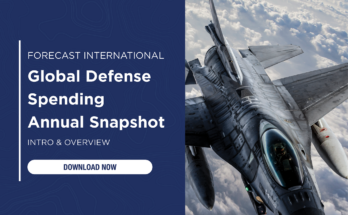by Derek Bisaccio, International Military Markets Analyst, Forecast International.

U.S. President Donald Trump attends meeting with Gulf Cooperation Council leaders on May 21, 2017.
Source: White House
Early on June 5, a number of Arab countries announced in concert their decision to sever ties with Gulf State Qatar. The move by the four countries – Bahrain, Egypt, Saudi Arabia, and the United Arab Emirates (UAE) – came just days after a hacker group announced it would release a trove of emails purportedly belonging to the Emirati Ambassador to the United States.
The reasons the four countries cited in cutting off relations varied. Egypt said it made the move “in light of the continued insistence of the Qatari government on taking a stance against Egypt,” namely “the failure of all efforts to persuade Qatar against supporting terrorist organizations, chiefly the terrorist Muslim Brotherhood organization.”[i] Bahrain accused Qatar of meddling in its domestic affairs. The UAE stated Qatar was viewed as destabilizing the region.
Saudi Arabia, meanwhile, took the step of accusing Doha directly of supporting “the activities of the Iranian-backed terrorist groups in the Qatif province of Saudi Arabia and in neighboring Bahrain.” Similarly, Saudi Arabia said that Qatar has supported Ansar Allah, a rebel group in Yemen that currently controls the capital, Sana’a, and is an enemy of Saudi Arabia. As a result, Qatar was expelled from the Saudi-led coalition in Yemen. Riyadh further argued that Qatar has financed and harbored extremists, and “used the media that seeks to fan internal strife.”[ii]
Qatar generally denies these accusations. In a statement, the country’s Ministry of Foreign Affairs rejected the decisions to sever ties, saying “these measures are unjustified and based on false claims and assumptions.”[iii]
While no single incident was cited as the impetus for the moves, the severance of ties follows a series of hacks hitting Gulf states. Last month, hackers took over the state-owned Qatar News Agency (QNA), and posted false statements attributed to the country’s Emir, Sheik Tamim bin Hamad al-Thani, regarding Qatari foreign policy. Specifically, in the fake quotes Iran was called a “big power in the stabilization of the region” and Hamas, an offshoot of the Egyptian Muslim Brotherhood, was referred to as the “legitimate representative of the Palestinian people.”[iv]
Though Doha later strongly denounced the statements and noted it was hacked, Saudi and Emirati news agencies ignored those denials and continued to quote the fake statements. Saudi media went so far as to write articles offering “proof” that QNA was not hacked at all.[v] Saudi Arabia’s Al-Shaikh family even questioned the al-Thani family’s historical ties to Muhammad ibn Abd al-Wahhab, for whom the Wahhabism brand of Islam is named, asserting, “The claim belonging to the emir of one of the Gulf countries as being a descendent of Sheikh Muhammad ibn Abdul Wahhab is false and fabricated.”[vi]
Earlier this month, a shadowy hacker group referring to itself as GlobalLeaks claimed to have acquired the email account of the Emirati Ambassador to the United States, Yousef al-Otaiba. These, according to the hackers in a statement provided to the Daily Beast, “reveal how millions of dollars were used to hurt [the] reputation of American allies and cause policy change.”[vii]
While the full trove has yet to be publicly released, Al-Jazeera featured a piece asserting the email leaks could threaten Emirati foreign policy. The article quoted various analysts, but the fact that it was being run by Al-Jazeera likely was read by Qatar’s neighbors as payback for their coverage of the QNA hack. GlobalLeaks apparently denied in a statement to the Huffington Post that it had any connection to Qatar or another foreign government.[viii]
The severance also follows the explosion of a vehicle filled with explosives in Qatif, Saudi Arabia, on June 1[ix] and a shooting attack in Qatif the previous month – noteworthy given Saudi Arabia’s accusations against Qatar regarding Qatif, specifically. Qatar strongly condemned both of those incidents, and it is otherwise unclear on what grounds Riyadh accused Doha of support for militants in that area, especially as Qatar has not previously been accused publicly of involvement in Qatif. Gulf states have previously pointed to apparent Iranian support for proxies in Qatif as well as nearby Bahrain, where the proliferation of explosively formed penetrators, in particular, has suggested outside, probably Iranian, assistance.[x]
Lastly, The Financial Times reported on June 5 that the tipping point may have come from hostage deals negotiated between Qatar and Al-Qaeda’s Syrian affiliate and Iranian security officials. In April, Qatar was able to secure the release of members of the country’s royal family who had been kidnapped in Iraq. The country also was reportedly able to finance the release of some 50 Syrian militants in another deal. According to one Gulf official who spoke to The Financial Times about the reported payments, “The ransom payments are the straw that broke the camel’s back.” Doha reportedly paid out $1 billion; of this, $700 million went to Iranian officials or Iranian-backed Iraqi militias, while the remaining $300 million went primarily to Hayat Tahrir al-Sham, the latest iteration of al-Qaeda’s Syrian affiliate.
But even though stated reasons vary and a specific impetus, outside of the alleged ransom payments, is not necessarily certain, the severance of ties is the culmination of lengthy suspicion over Qatar’s foreign policy, which often is at odds with that of its allies in the Gulf Cooperation Council (GCC) and in the broader region. Other neighbors, including other GCC states, have certainly sought to stake out independent foreign policies, but where Qatar is different is in its willingness to buck the GCC.
Riyadh’s and Abu Dhabi’s responses to the QNA hacks were demonstrative. Though Qatar sternly denounced the statements attributed to its Emir as fake, both Saudi Arabia and the United Arab Emirates view those statements as indicative of Qatar’s real foreign policy in any case. The reported ransom payments, which occurred prior to the QNA hacks, were likely in mind in Saudi Arabia and the UAE, especially, as the hacks proceeded.
While Riyadh, Abu Dhabi, and Cairo are skeptical of, and hostile to, the Muslim Brotherhood, Qatar is widely seen as supportive of the group, which, as highlighted by Qatar’s neighbors, receives favorable coverage from Qatari media outlets like Al-Jazeera. Doha was a strong backer of former Egyptian President Mohamed Morsi and criticized the coup led by then-Egyptian Armed Forces Chief of Staff Abdel Fattah el-Sisi, who succeeded him as president. Al-Jazeera has maintained a critical stance on President Sisi’s domestic policies since taking over, to Cairo’s annoyance.
Furthermore, Qatar’s relations with Iran have often been the subject of criticism from other Gulf states. While relations between the GCC and Iran have deteriorated, especially in the last few years, Doha has sought to chart a balancing course with Iran and urge “good neighborly relations.”[xi]
It is unclear what will come next as the Gulf dispute deepens. The Maldives, Libya, and Yemen have followed suit in cutting ties with Qatar, but the real impact is the effect the severance with Qatar’s immediate neighbors will have. Saudi Arabia – joined by Bahrain, the UAE, and Egypt – closed air, land, and sea borders with Qatar, which will, if prolonged, have a large effect on Qatari imports. Qatar imports most of its food, and 40 percent of those imports are believed to come over land from Saudi Arabia.[xii] Qatar is a major transportation hub, but the closure of airspace will force its airlines to reroute their flights and cancel major routes to cities in Saudi Arabia, the UAE, and Egypt.
Restrictions on use of air, land, and sea borders have been suggested by Saudi officials before as a part of efforts to pressure Qatar on its foreign policy. Several years ago, in 2013, Qatar, under heavy pressure from Egypt, Saudi Arabia, and the UAE, pledged to expel exiled Egyptian Muslim Brotherhood figures from the country and tone down its criticism of Egypt.
As indicated by the recent severance of ties, Riyadh, Abu Dhabi, and Cairo do not view Qatar as going anywhere near far enough in cutting its support for the Muslim Brotherhood. Moreover, the strongly worded statements alleging specific areas of Qatari support for terrorism – including alleged meddling in GCC states – suggest that the countries are looking for significant and not just symbolic concessions out of Doha. The situation would otherwise not have escalated nearly this much.
What such concessions might entail is up to debate. Reining in Al-Jazeera’s coverage likely will be a component of the demands made of Qatar, as will a greater demonstration of Doha distancing itself from the Muslim Brotherhood. Qatar is likely to face further pressure over its relations with Iran. Doha’s willingness to accommodate these demands, and meet them in a manner satisfying to its neighbors, will have a direct impact on how far the situation escalates, including what effect the dispute has on Qatar’s ruling family itself.
The latest developments offer a key foreign policy challenge for the United States’ new administration under President Donald Trump. The U.S. president recently visited Saudi Arabia – where advisers asserted President Trump “united the entire Muslim world”[xiii] – in an effort to promote ties with Saudi Arabia and other Arab allies. Riyadh, for its part, views the Trump administration as a key ally,[xiv] which, combined with the fact that the United States’ Central Command has a forward base in Qatar, makes it likely the United States was informed of Riyadh’s intentions with Qatar well prior to the cut in ties.
But nevertheless, with the U.S. president’s domestic critics pointing to a downsized State Department, the Trump administration will have to prove it can manage the situation in a manner that defuses the tension between the Gulf countries, all of which are allies of the United States and key partners in regional security matters. The timing of the dispute is likely negative for the United States’ operations against the Islamic State in the group’s Syria bases, where a U.S.-backed force aims to wrest control of the terror group’s former administrative capital, Raqqa. Central Command, operating out of al-Udeid air base in Qatar, is responsible for these operations. The presence and importance of the U.S. base in Qatar as well as the Trump administration’s newly established and growing friendship with Saudi Arabia, even beyond traditional American-Gulf relations, offer the administration a significant amount of leverage regarding the dispute, but managing it will test the administration’s foreign policy chops as it seeks to ramp up pressure on Iran and simultaneously defeat extremist groups like the Islamic State.
UPDATE (June 5): This post has been updated to include reporting by The Financial Times, which emerged after this article was originally published.
Please feel free to use this content with Forecast International and analyst attributions, along with a link to the article. Contact Ray Peterson at +1 (203) 426-0800 or via email at ray.peterson@forecast1.com for additional analysis.
The Forecast International International Military Markets series examines the military capabilities, equipment requirements, and force structures inventories of 140 countries, with corresponding coverage of the political and economic trends shaping the defense market outlook for individual countries and regions.

[i] Ahram Online, “Egypt cuts ties with Qatar for ‘supporting terrorist organizations,'” June 5, 2017. http://english.ahram.org.eg/NewsContent/1/64/270264/Egypt/Politics-/Egypt-cuts-ties-with-Qatar-for-supporting-terroris.aspx
[ii] Saudi Press Agency, “The Kingdom cut off diplomatic and consular relations with the State of Qatar,” June 5, 2017. http://www.spa.gov.sa/viewfullstory.php?lang=ar&newsid=1637278
[iii] Al-Jazeera, “Gulf diplomatic crisis: Qatar’s reaction in full,” June 5, 2017. http://www.aljazeera.com/news/2017/06/gulf-diplomatic-crisis-qatar-reaction-full-170605071246160.html
[iv] Jon Grambrell, “Hack, fake story expose real tensions between Qatar, Gulf,” Associated Press, May 24, 2017. http://www.washingtonpost.com/world/middle_east/qatar-says-state-news-website-hacked-fake-article-published/2017/05/23/f79c40d6-4026-11e7-b29f-f40ffced2ddb_story.html
[v] Al-Arabiya, “Proof that Qatar News Agency was not hacked,” May 24, 2017. http://english.alarabiya.net/en/media/digital/2017/05/24/Proof-that-Qatar-News-Agency-was-not-hacked.html
[vi] Al-Arabiya, “Al-Sheikh family in Saudi Arabia: Gulf emir attribution to our family is fake,” May 28, 2017. http://english.alarabiya.net/en/News/gulf/2017/05/28/Al-Sheikh-family-in-Saudi-Arabia-Gulf-emir-attributing-to-our-family-is-a-liar-and-a-fake.html
[vii] Kevin Poulsen, “Hackers Vow to Release Apparent Trove of U.A.E. Ambassador’s Emails,” The Daily Beast, June 2, 2017. http://www.thedailybeast.com/hackers-vow-to-release-apparent-trove-of-uae-ambassadors-emails
[viii] Akbar Shahid Ahmed, “Someone Is Using These Leaked Emails To Embarrass Washington’s Most Powerful Ambassador,” The Huffington Post, June 3, 2017. http://www.huffingtonpost.com/entry/otaiba-ambassador-uae-leaked-emails_us_5932bf04e4b02478cb9bec1c
[ix] The National, “Two ‘terrorists’ killed in Qatif blast: Saudi official,” June 2, 2017. http://www.thenational.ae/world/middle-east/two-terrorists-killed-in-qatif-blast-saudi-official
[x] Michael Knights, “Iranian EFPs in the Gulf: An Emerging Strategic Risk,” The Washington Institute, February 23, 2016. http://www.washingtoninstitute.org/policy-analysis/view/iranian-efps-in-the-gulf-an-emerging-strategic-risk
[xi] Reuters, “Amid strains, Qatar urges Iran, Gulf Arabs to be good neighbors,” September 13, 2016. http://www.reuters.com/article/us-gulf-iran-qatar-idUSKCN11J0PH
[xii] Simon Atkinson, “Qatar row: Economic impact threatens food, flights and football,” BBC News, June 5, 2017. http://www.bbc.com/news/business-40156029
[xiii] Alex Pappas, “Administration official: ‘Donald Trump united the entire Muslim world,'” Washington Examiner, May 23, 2017. http://www.washingtonexaminer.com/administration-official-donald-trump-united-the-entire-muslim-world/article/2623966
[xiv] Derek Bisaccio, “Gulf Allies See Friend in Trump Administration,” Forecast International, May 3, 2017. http://www.defensesecuritymonitor.com/wordpress/gulf-allies-see-friend-in-trump-administration/
Erika Solomon, “The $1bn hostage deal that enraged Qatar’s Gulf rivals,” The Financial Times, June 5, 2017. http://www.ft.com/content/dd033082-49e9-11e7-a3f4-c742b9791d43
For 50 years, Forecast International intelligence reports have been the aerospace and defense industry standard for accurate research, analysis, and projections. Our experienced analysts compile, evaluate, and present accurate data for decision makers. FI's market research reports offer concise analysis of individual programs and identify market opportunities. Each report includes a program overview, detailed statistics, recent developments and a competitive analysis, culminating in production forecasts spanning 10 or 15 years. Let our market intelligence reports be a key part of reducing uncertainties and mastering your specific market and its growth potential. Find out more at www.forecastinternational.com



